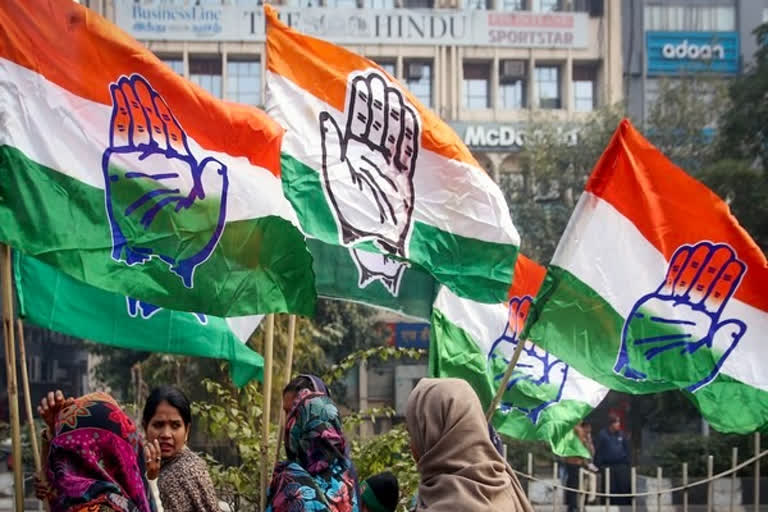New Delhi: The Congress on Tuesday played down the criticism over support from some of the NGOs, who had opposed the previous UPA government over alleged corruption, for its nationwide foot march starting September 7.
On Monday, some NGOs represented by activists like Yogendra Yadav, Medha Patkar, and Aruna Roy, all of whom had taken part in the 2011 anti-corruption protests led by Anna Hazare against the UPA government, extended their support for the Congress’ Bharat Jodo Yatra after they had a detailed discussion with Rahul Gandhi.
“There were socialists, Lohiaites and communist groups, Congress supporters and Congress critics in yesterday’s meeting. All had come,” Congress communications in-charge Jairam Ramesh said in response to a query.
"It is true that some of them had opposed our government 10 years ago. They had started a movement against us due to some misconceptions. It is good that they have now realised that the Congress is the only alternative. They have understood that today the constitution is in danger, democracy is in danger and they need to strengthen the Congress hand,” he said.
Congress veteran Digvijay Singh, who heads a national coordination panel for the yatra, said though it is a Congress yatra, everyone who believed in the cause was welcome to join the foot march. “All those with different ideologies but opposed to the divisive ideology in the country are welcome to join the yatra. When we have planned the yatra for all, why should we bother who supported us or not earlier,” Singh said.
“There is one ideology which is thrusting itself on others and is disturbing social harmony. Hence, we want all to join our yatra,” he said. The remarks from the Congress leaders came on the day the party launched a dedicated website, logo and tagline for the 3500 km Bharat Jodo Yatra, which will pass through 12 states and 2 UTs over 150 days. The yatra will be launched from Kanyakumari in Tamil Nadu on September 7.
The party had faced questions over getting support for the yatra from some NGOs as it has been arguing since 2014 that a fake narrative was created against the then UPA government over alleged corruption in the allocation of 2G spectrum and coal blocks, which ultimately led to the ouster of the Congress-led alliance.
Later, the Congress argued that none of the allegations related to the 2G spectrum and coal blocks could be proved in the courts though two separate controversial reports of the CAG headed by Vinod Rai had flagged the issues, which had led to major political controversies.
Also read: Civil society groups come out in support of Congress' Bharat Jodo yatra
During the UPA years from 2004 to 2014, when the government was headed by prime minister Manmohan Singh and party chief Sonia Gandhi chaired the National Advisory Council, there were often serious differences of opinion between the two bodies.
There were concerns expressed within the government over a strong RTI Act in which activist Aruna Roy played a role. Later, the UPA faced charges of perceived policy paralysis when alleged differences between the NAC and the government surfaced over issues related to environmental clearances and the food security bill. Rahul himself led the protests against a big FDI project as he stood for the rights of the tribals in the Niyamgiri Hills of Odisha in 2010.
However, the remarks of the Congress veterans showed that animosity against the social activists who slammed the UPA earlier has been forgotten and perhaps forgiven in 2022 when the grand old party is trying hard to revive itself nationally ahead of the 2024 national elections as well as preparing to counter the alleged divisive agenda of the ruling BJP and the policies of the Modi government.
“The yatra has been launched to deal with the challenges of economic disparities in the country, social disharmony, and violation of Constitutional principles. Sonia Gandhi had asked us to launch the yatra to fight against hatred and anti-Constitution practices,” said Singh. The yatra would run at three levels simultaneously and comprise three levels of participants, one national Baharat yatris, guest yatris from states where the yatra is not passing through and local yatris.
Local yatras would be conducted in states and regions where the national yatra will not pass through to connect with the locals. Arrangements have been made for night stay of the yatris in containers mounted on trucks and food would be prepared on the spot.
To broaden the movement, local issues like those related to farmers, fishermen, and weavers have been dovetailed in the yatra plan and there would be small meetings to be addressed by party leaders.
“No such mass public contact has been ever launched in the country on this scale. This is a public movement by the Congress to restore social harmony and unity in the country,’ said Singh, who argued that it is not a political initiative. There were 4-5 routes planned for the yatra but the one suited to geography and security considerations was approved finally to ensure foot march.
The daily events of the national yatra would be streamed live on the website launched for the purpose and people can register at the site if they wish to join the movement, said Singh. All along, pamphlets detailing the need for the yatra would be distributed among the public to create awareness, he added.



